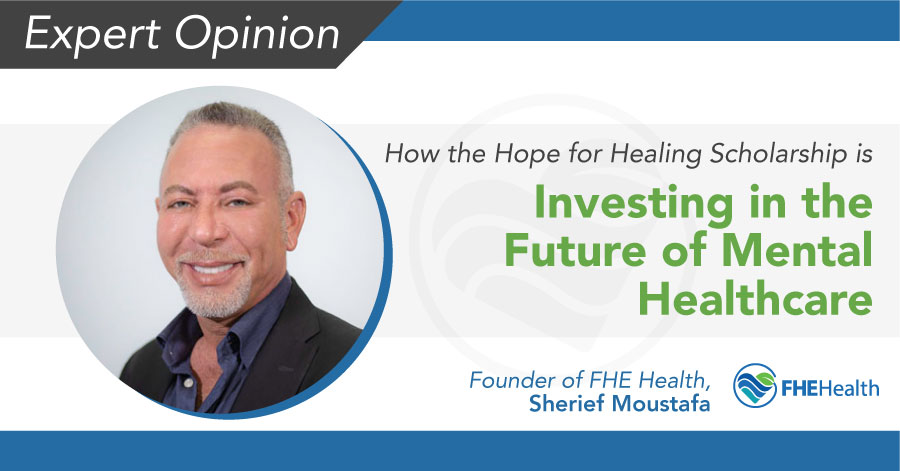
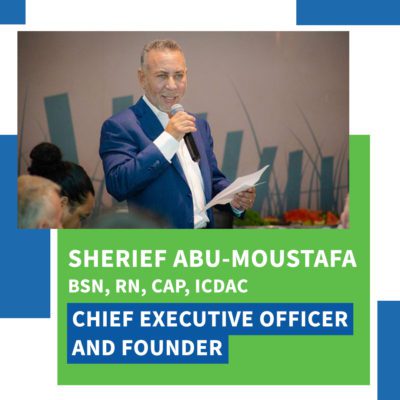 The application period for FHE Health’s second, annual “Hope for Healing Scholarship” is drawing to a close: January 15, 2021 is the final deadline to apply. One of the $5000 educational grants will be awarded to an undergraduate; the other— to a graduate student.
The application period for FHE Health’s second, annual “Hope for Healing Scholarship” is drawing to a close: January 15, 2021 is the final deadline to apply. One of the $5000 educational grants will be awarded to an undergraduate; the other— to a graduate student.
Founder of FHE Health Sherief Abu-Moustafa helped start the Hope for Healing Scholarship. Moustafa has been at the helm of FHE and in the field of addiction treatment and mental health for more than two decades. In a recent interview, the veteran business leader and philanthropist shared what inspired him to begin offering the scholarship, what he hopes will be its impact, and why investing in the future of behavioral healthcare is so critical. He also gave an update about where things stand with this year’s application process, including the level of interest in an unusual and tumultuous year.
Update on Applications for the 2021 Hope for Healing Scholarship
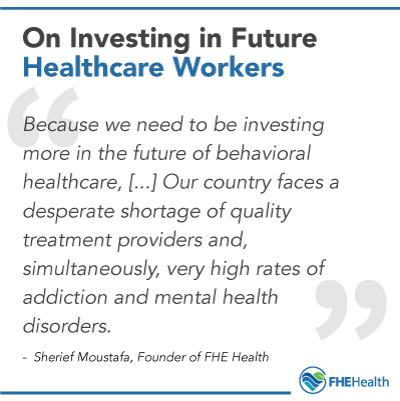 First, how, if at all, have the events of this year impacted the level of interest from applicants? “That’s somewhat hard to gauge definitively since we’re still receiving applications,” Moustafa said, but he was quick to note that already more than 270 applications have been collected. “And, if the dash to apply in the first round [for the 2020 scholarship] is any indication, there may be a flood of last-minute submissions,” he added.
First, how, if at all, have the events of this year impacted the level of interest from applicants? “That’s somewhat hard to gauge definitively since we’re still receiving applications,” Moustafa said, but he was quick to note that already more than 270 applications have been collected. “And, if the dash to apply in the first round [for the 2020 scholarship] is any indication, there may be a flood of last-minute submissions,” he added.
Nearly 500 candidates from over 150 colleges applied for the first Hope for Healing Scholarship, which was awarded this past spring, and the applicants represented a wide variety of majors including nursing, neuroscience, psychology, psychiatry, cognitive sciences, social work, education, sociology, and biology.
Given that precedent, Moustafa predicted that choosing two recipients for 2021 will (again) be tough for FHE’s scholarship committee. They will have to weigh factors like demonstrated need next to qualifications such as contributions and future promise in the field of mental and behavioral health, in order to narrow down the field of qualified applicants to a small group of finalists; from there, the committee will determine one undergraduate and one graduate recipient of the 2021 award, based on finalists’ answers to a series of interview questions.
What Are the Goals of the Hope for Healing Scholarship?
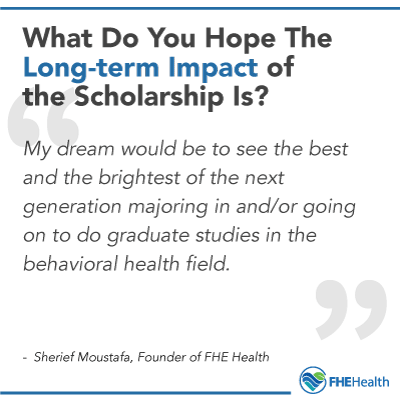 Why go to all this trouble every year? “Because we need to be investing more in the future of behavioral healthcare,” Moustafa said. “Our country faces a desperate shortage of quality treatment providers and, simultaneously, very high rates of addiction and mental health disorders.”
Why go to all this trouble every year? “Because we need to be investing more in the future of behavioral healthcare,” Moustafa said. “Our country faces a desperate shortage of quality treatment providers and, simultaneously, very high rates of addiction and mental health disorders.”
As illustration, Moustafa pointed to the finding by the Substance Abuse and Mental Health Administration that “only one in ten Americans gets addiction treatment— even in the middle of an opiate and overdose epidemic.”
It’s a public health crisis that needs an aggressive, multi-faceted response, but Moustafa believes one part of the answer is “more people trained and equipped to understand and treat mental health and substance abuse needs … If the Hope for Healing scholarship encourages more gifted men and women to enter the field of behavioral health—I don’t care whether they’re clinicians, nurses, doctors, researchers, etc.—that’s the kind of positive impact and legacy that we want to make.”
Why the Need for Supporting Education in Behavioral Health?
Behavioral health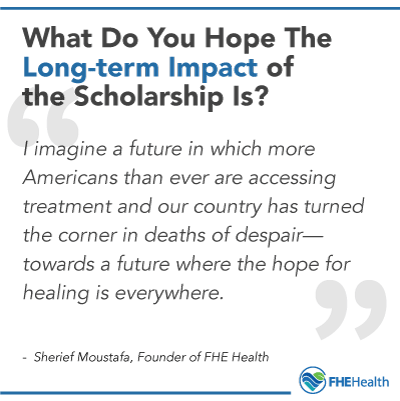 is an area of study that remains a bit marginalized as compared to other fields, Moustafa noted. But it’s also “an exciting realm for groundbreaking research, innovative treatments, and seeing the tremendous difference these can make in people’s lives.” As evidence, Moustafa cited the “diverse and exciting range of studies and vocational interests” represented by the 2020 scholarship finalists alone.
is an area of study that remains a bit marginalized as compared to other fields, Moustafa noted. But it’s also “an exciting realm for groundbreaking research, innovative treatments, and seeing the tremendous difference these can make in people’s lives.” As evidence, Moustafa cited the “diverse and exciting range of studies and vocational interests” represented by the 2020 scholarship finalists alone.
“The application process gives us an opportunity to highlight promising contributions in the field and expose a wider audience to the exciting stuff happening there,” Moustafa said.
By supporting education in the behavioral health field among young, aspiring students and second-career professionals, the Hope for Healing scholarship aims to broaden the appeal of studies in addiction treatment and mental health.
The Long-Term Impact of the Hope for Healing Scholarship?
Fast forward 10 or 20 years, and what will be the longer-term impact of the Hope for Healing Scholarship? Moustafa said:
My dream would be to see the best and the brightest of the next generation majoring in and/or going on to do graduate studies the behavioral health field. Past recipients of this award would now be paying it forward as leaders in their field, mentoring others. And, if I’m really dreaming big, I imagine a future in which more Americans than ever are accessing treatment and our country has turned the corner in deaths of despair— towards a future where the hope for healing is everywhere.
Interested in a career in addiction or mental health treatment? Learn more about FHE’s Hope for Healing Scholarship.






